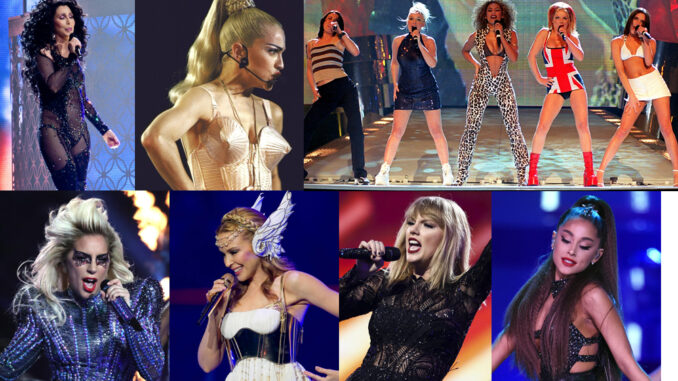
By Rami Mansi
Twenty-first-century queer music reached a major peak on Sept. 22 when four artists of varying levels of superstardom released new respective albums: Doja Cat’s “Scarlet,” Slayyyter’s “STARF***ER,” Chappel Roan’s “The Rise and Fall of a Midwest Princess,” and Kylie Minogue’s “Tension.” For two weeks, the community was ecstatic over the new pile of gold wrapped in electro-pop, femininity, and musical homage. However, this ecstasy wouldn’t last long as the fandoms moved on to the next release, and these four singers moved on to their next projects.
This constant need for absorbing new entertainment is something that has plagued music fans for as long as you could buy music, but who caused this need for overstimulation? Why do we as fans crave that feeling, and how can we take a step back to appreciate the music that’s in front of us?
Fans have always wanted an easier way to get music from their favorite artists, from pirating songs to supporting and encouraging an artist to create more content, or simply just buying the album when it’s out on iTunes. But now in the online age of YouTube, Spotify, Apple Music, etcetera, we have the choice to absorb this music at an easier and faster rate.
If you give a lollipop to a child every time they ask for one, they’ll constantly crave that sweet confection. The same principle goes for music fans. If you give us the choice to absorb entertainment of our own free will, we will choose to do what we could never have done before: give ourselves everything. The reason this new-day issue of overstimulation hurts consumers is that we don’t know how to handle this newfound freedom of choice in a healthy and concise way.
Artists have been releasing music at similar times for years. However, releasing on the same exact date has become a consistent trend after 2015 when charting for the Billboard Hot 100 changed the day that various factors for charting started counting. According to Complex, artists can maximize their chart potential by releasing music on Fridays. By reaching high on the charts, an artist can get free publicity, leading to snowballing listeners on their new piece. By acting in their best interest under this capitalist system, the main goal of enriching the music industry with new creatives gets ignored.
But charting is not the only effect of this new streaming revolution. A sustained lack of releases from artists and music droughts have become normalized at a rapid pace. With multiple singers releasing and promoting their work at the same time, the periods of time in which no music from entire groups of artists is released have become substantial. This lack of music leads to the production of quick and cheap singles that burn out and don’t make any impact.
Due to companies overproducing and overworking their artists to push out work rapidly, the end product is something that is half-baked. Although to some extent the songs are still a part of the artist’s discography and have some form of entertainment for fans, the contribution given to the music community is not impactful and sometimes ordinary. This coupled with the fans who are used to constant content means they’re quick to move on to another artist who is creating a similar sound. This is why when a song goes viral, we see twenty other songs being made just like it. Fans have developed a lesser sense of appreciation for the artists and instead care more about whatever music is being put in front of them. By quickly moving on to another musician with a similar sound, the relationship artists and fans once had is diminished.
With money-making at the forefront and fans as an afterthought, labels push not only their artists to overwork themselves and create an obscene amount of music, but also expect fans to consume it all at once. This overproduction of content leads to overstimulation for fans. To enjoy the music and have so many artists releasing music and content at the same time, consumers can feel rushed to indulge in everything presented to them. This rush has its perks, like fast cash for labels and a constant stream of music for listeners, but do we want to sacrifice the traditional album cycle promotion for a quick burnout album or single?
Fans, now conditioned to want these new fabs at an unhealthy rate, want new crash landings of pop music every week. But if all new releases are pop music shake-ups, then is anything musicians do impactful to their audience anymore? Will we truly ever have another Lady Gaga 2009 VMA debut, or perhaps another Nicki Minaj “Monster” verse?
As a pop music fan, it’s tiresome to see what pop music has become. With songs being shortened to fit the length of a TikTok video of around 2 minutes, music is becoming less about creating the next pop culture shake-up and more about who can rake in the most money.
It’s disheartening to know that we’ll seldom get another timeless piece of art due to the New York City level of speed the industry is running on. The reason pop music ran so well in the past was that labels took time with the art they put out; they put major artists together and let them collaborate. Music was not just about who could get the highest chart, but who could be a legendary performer and become an unstoppable force worldwide. The fans want that back, but with the labels and musicians taking a step back and slowing down, there’s a rush to create half-good short songs for TikTok, where we could have albums made that benefit pop culture history instead.
In an age of constant online attention, fans should take a step back and really appreciate the music being put in front of them. Listening to music at your own pace is a practice I believe we can all learn and benefit from.
